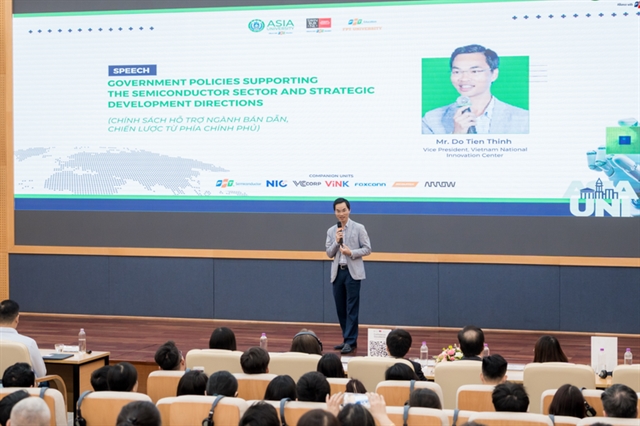Việt Nam is poised to leverage its youthful workforce to develop a robust semiconductor industry, according to an IT expert.

HÀ NỘI — Việt Nam is poised to leverage its youthful workforce to develop a robust semiconductor industry, according to an IT expert.
The comments were made at a recent seminar organised by Asia University Vietnam in Hà Nội, with the speaker emphasising that establishing training links with international partners, particularly those lalready excelling in semiconductor technology, is a viable strategy for growth.
At the event, Đỗ Tiến Thịnh, Deputy Director of the National Innovation Centre, highlighted that the semiconductor industry is a core sector of information technology. Thịnh stated that as the country is aiming for technology independence it must master the core core elements needed in order to support development.
He said that the semiconductor industry encompasses three key stages including production, design and packaging and testing.
Currently, Việt Nam is primarily engaged in the packaging and testing phase. However, the Government's strategy aims to advance it into the design stage, which represents a billion-dollar market with significant opportunities.
Thinh said: "This is a golden time for students to choose careers in the semiconductor industry. With attractive salaries and sustainable prospects, young individuals, particularly those motivated to learn, can benefit greatly."
The national goal is ambitious - training between 50,000 and 100,000 semiconductor workers by 2030. Despite lots of potential and an eager and ambitious generation, Việt Nam faces challenges in terms of human resource supply, with only about 5,000 semiconductor engineers currently available.
The government is committed to enhancing semiconductor training quality through various initiatives such as investment in 18 key laboratories, collaboration with major economies in chip production and financial support for expensive equipment and technology.
The Director of FPT International University Training Institute, Hoàng Việt Hà, said that they have signed an agreement with Asia University in Taiwan to train semiconductor professionals. Students will spend two years at FPT focusing on IT and AI, followed by two years in Taiwan specialising in semiconductor technology.
The programme is entirely in English, with additional training in Chinese, to ensure students can communicate effectively in Taiwan.
The partnership between educational institutions and businesses aims to bridge the gap in training, providing students with practical experience. The National Innovation Center advocates for aligning training with international market needs, fostering a mindset of those who are taught abroad are 'going to return' to benefit Việt Nam's semiconductor industry. — VNS





